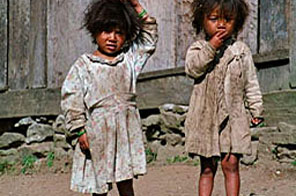Poor getting poorer due to bad leadership
KATHMANDU: Nepalis are poor and becoming still poorer because of bad political leadership, economists said in a seminar on the global economic crisis and its impact on the Nepali economy here today. They blamed visionless political leadership for growing poverty and weakening financial position of the country.
“Economy is on the verge of a crash because of bad political leadership,” said Bharat Devkota of Center for Economic Development and Administration (CEDA). “Political leaders are dull and visionless. The Nepali economy is reflecting it since 1990.” According to Devkota, Nepalis’ real income has fallen since 1973 compare to previous decades. Devkota presented a paper on ‘The state of Nepalese Economy’.
If inflation to be counted in US currency, the purchasing power of Nepalis is negative these days, he said. Nepali per capita income is $410 which is equal to real income $334 of 2008 and there has been no progress in a year. Likewise, the government’s priority programmes — education for all, health for all, safe drinking water and sanitation — have failed to meet people’s needs and expectations. “There is a question mark over the quality of health services,” he said.
Chief guest Dr Arun Sayami urged political parties to be responsible towards people’s lives and livelihood. “Political crisis fuelling financial crisis. So, correction in the political field is a must,” he said.
Head of Friedrich Ebert-Stiftung (FES) Dev Raj Dahal agreed with Sayami’s views and said, “It is high time to revise the policy and make people the recipient of economic benefits.” Dahal suggested the government start employment-centred industries to accommodate Nepali youths affected by the global economic meltdown. The Nepali job market abroad has been shrinking since February 2009 and its impact on the economy was seen in remittance last month. Remittance is contributing around 19 per cent to the GDP, with over Rs 200 billion in the fiscal year 2008-09.
Prof Dr Pushpa Shrestha presented a paper focusing on feminization of poverty. She stressed on mass-scale micro credit programmes for women. “If women get equity, there will be a drastic change in status,” she said. But some participants did not agree with her views. “A full cycle of recognition, access to resources and representation is needed for women’s empowerment,” a participant said.
CEDA and FES have organized the two-day seminar on impact of global financial crisis on Nepalese economy.






